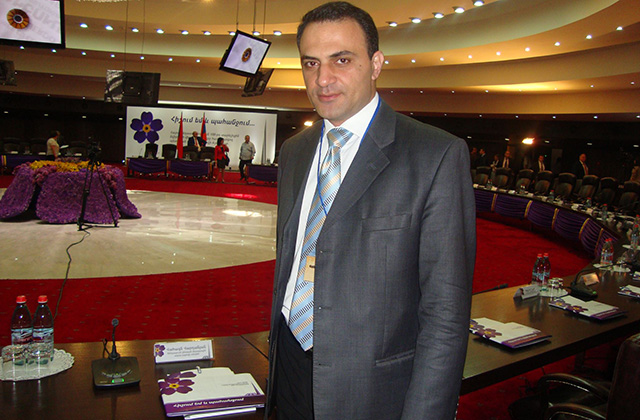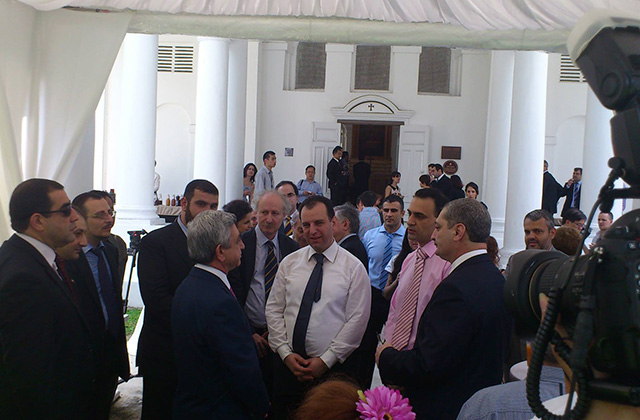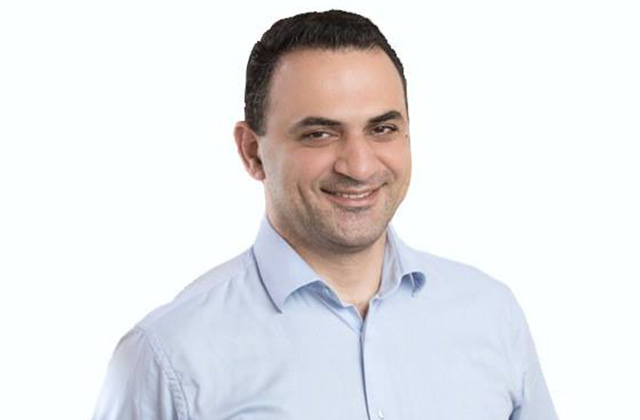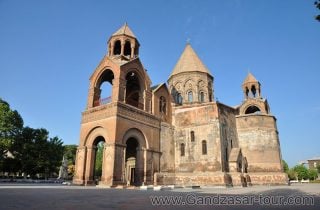It is the economic development of Armenia, as well as the coherent and effective development of Armenia’s national reputation and brand that will significantly accelerate the process of the Genocide affirmation: Vahagn Vardanyan

Vahagn Vardanyan was born in 1973, in Yerevan. He studied at Yerevan Institute of National Economy, then at the American University of Armenia (affiliate of the University of California). He is a Master of Business Administration and International Affairs. For about 10 years he has worked in Armenian banking system—Armenian Development Bank as Head of Strategic Planning, then as Executive Vice-President. From 2005 he worked and lived in Eastern Asia, until 2008 in China, the in Singapore at Hillside World Academy as Head of High School and IBDP Coordinator. Besides Armenian, he speaks Russian, English and Chinese.
Vahagn Vardanyan is conducting his doctoral research in National University of Singapore. With professional interests in national identity, diaspora-homeland relations, nation branding and national development, he has presented at conferences and meeting in Europe, Asia, Australia and his native Armenia.
On occasion of the 25th anniversary of Armenia’s independence, Vahagn Vardanyan appeared with a letter-proposal on September 21, 2016. 168.am presents V.Vardanyan’s proposal, which outlines new ways of Genocide recognition and Armenia’s development—how to change it, by making an influential country in the region.
Ministry of Foreign Affairs of Armenia, Yerevan
Ministry of Foreign Affairs of Artsakh, Stepanakert
Ministry of Diaspora of Armenia, Yerevan
The Armenian Genocide Museum-Institute, Yerevan
The Armenian National Institute, Washington D.C.
Armenian National Committee of America, Washington, D.C.
Armenian Assembly of America, Washington, D.C.
Armenian National Committee of Australia, Sydney
Dear Armenians,
Happy 25th anniversary of Armenia’s independence!
Since 1994, every year, U.S. presidents have been addressing the world on the Armenian Genocide. Throughout these decades, days and weeks before April 24, we Armenians focus on how the American President will refer to our tragedy in his annual statement. This year it happened again when President Obama used the expression ‘Medz Yeghern’ in his annual address, the phrase we Armenians use (and, I would say, feel). By observing the trend of the Genocide affirmation, in particular, its recent developments, I have decided to share my thoughts with you, while I do consider that new ideas need time until are widely accepted.
It is a well-known fact that when the word ‘genocide’ was introduced in 1944 tragedies such as the Armenian and Jewish genocides had already taken place. The word became a legal term only after the UN passed the Convention on Genocide in 1948. It was much later, in 1960s, when the word ‘Holocaust’ was put into practice and, over time, it had become a unique identification of the Jewish Genocide. The recent developments related to the recognition of the Armenian Genocide, the centennial commemoration events before and during 2015, followed by the introduction of the Aurora Prize earlier in 2016 – a conceptually new global endeavor, have facilitated the recognition process by creating a different dimensional framework for understanding and condemning the Armenian Genocide (and other such tragedies).
Certainly, Armenian, Jewish, Rwandan and other mass annihilations had different roots and locations, and those who carried them out were different people. However, they all fall under the term ‘genocide’, which has been defined as “acts committed with the intent to destroy, in whole or in part, a national, ethnic, racial or religious group” (Convention on the Prevention and Punishment of the Crime of Genocide, NY, December 9, 1948, www.un.org). In case of the Armenian tragedy, this exact meaning was stated, in particular, by American presidents James E. Carter and Barack H. Obama, who, while in office, admitted that “there was a concerted effort made to eliminate all the Armenian people” and that the Armenians were set out to be destroyed (May 16, 1978 and April 24, 2010, respectively).
Many would argue that in order to make the expression powerful, the legal term ‘genocide’ must be used in official statements. But that was done as well. It was Ronald Reagan, who became the first U.S. president in office who referred to the Armenian tragedy by using the word ‘genocide’ (Proclamation of President Reagan, April 22, 1981). This was not, however, 2 the only case for the ‘G’ word being used by the American Government in regards to the Armenian tragedy. Long before it, in far 1951, in the Reservations to the Convention on the Prevention and Punishment of the Crime of Genocide (May 28, 1951), submitted to the International Court of Justice, the United States Government referred to “the Turkish massacres of Armenians”, along with other similar tragic cases, as “outstanding examples of the crime of genocide” (1951: 25). Thus, it is surprising to see that these facts have been underestimated until nowadays. At the same time, however, in case of the Genocide recognition by Uruguay, which is widely perceived as the first country to do so officially, neither the joint Declaration of Senate and House of Representatives (April 20, 1965), nor the Uruguay Law (March 26, 2004) state the word ‘genocide’, but instead “nationality slain” and “national massacre”, respectively. The above-mentioned documents, including originals in Spanish, are available on the website of the Armenian National Institute (ANI), a Washington, D.C.-based institution “dedicated to the study, research and international affirmation of the Armenian Genocide” (www.armenian-genocide.org), as well as in the comprehensive coverage of the Genocide recognition documents in “The Armenian Genocide: The World Speaks Out, 1915-2015, Documents and Declarations” (Sassounian, 2015).

The contemporary trends in regards to the Armenian Genocide recognition, including the historical speech by His Holiness Pope Francis given in the Vatican (April 12, 2015), his most recent re-affirmation of the Genocide (June 24, 2016) and the resolution by the German Bundestag (June 02, 2016) are crucial steps toward the establishment of justice and global recognition of the Armenian Genocide. Following these developments, I think that
1) The international affirmation of the Genocide is an ongoing process; it might take decades until all sovereign nation-states officially recognize it. The Genocide has already been recognized by nation states in North and South America, Europe, and even in the Middle East. I would argue that, first of all, it is the economic development of Armenia, as well as the coherent and effective development of Armenia’s national reputation and brand that will significantly accelerate the process of the Genocide affirmation. Armenia has no other choice but to develop its small economy into an effectively specialized model in the region. Armenia, by virtue of historical and demographic changes, has become the only (predominantly) Christian country located in both Europe and the Middle East, a key attribute that can be used in branding the country. By sharing European cultural and education traditions, the Armenian civilization, which used to be dominant on the area known as the Armenian Highlands, is inseparable from that of the Middle East as well, particularly, when it comes to some social-cultural norms.
2) The Republic of Armenia, by being a historical-cultural-political representative of the whole Armenian nation, needs to further deepen its inclusionary approach toward the Diaspora. By connecting Europe, the Middle East and Asia, Armenia’s development, to a large extent, depends on its ability to jump over the region in order to become an effective bridge between European and Middle Eastern civilizations. It is of vital importance to transform Armenia into a country of strong regional influence, even though it will take couple of decades to reach it. Such ambitious goal can be achieved through development of a regionally well-integrated economy and, on top of it, through a coherent demographic progress. It is critical to double Armenia’s population number, to reach 5 mln people in a clearly-set term perspective, let’s say, by year 2030. This assumes, on average, 5% annual growth. It is obvious that such a target cannot be achieved by natural growth only. The Armenians are a global nation, spread all-over-the- 3 world. Inclusionary policies toward the Diasporan can become effective on a large scale if economic motivation becomes the dominant factor. Even if many diasporans do not settle in Armenia permanently in the short term, their frequent visits, driven by economic interests, will strengthen their ties and, eventually, will make Armenia attractive for their families as well.
3) The Republic of Armenia, Armenian organizations, and Armenians worldwide should expect an official recognition of the Genocide by the Republic of Turkey. However, even though it was not Turkey who committed the Genocide, but the Ottoman Empire, Turkey keeps denying it and, thus, indirectly makes the world community to consider it the one responsible for the tragedy. If it is assuming that role, then we should expect even less, as anyone has a right to deny accusations, but it is the justice system that is to persecute and punish for committing a crime. Throughout the past hundred years, it would have been possible to see the Turkish Republic recognizing the Genocide. However, it has not happened, arguably, because of two main factors – a possibility to lose the rights on properties that used to belong to Armenians in the Ottoman Empire, which are estimated to be worth hundreds of billions of US dollars at present-day prices, as well as because of solidarity with the Republic of Azerbaijan. Coherent efforts toward promoting the Genocide recognition should continue to be made. At the same time, after a number of nation states, presidents, parliaments, states and provinces (including 45 out of 50 American states), heads of governments and supranational bodies have recognized and/or condemned the Armenian Genocide, it is time to move from recognition to legal actions. On this way, various documents, including those of Turkish Military Tribunal trials (1919) should be used, as they served a ground for implementation of the Treaty of Sèvres (partly though), as well as for partitioning the Ottoman Empire.
4) Recently, manipulations with history through mass propaganda have created a unique situation – the term ‘genocide’ is facing a threat of being inflated or of losing its value. For instance, presentation of killings in formerly-known Khojalu village in Artsakh by conflicting Azerbaijani sides in early-1992 as a genocide is one of such examples. When a crime is committed, usually, the first step is to find out who can benefit from it. The world needs to know the reality behind the ‘Khojalu’ misinterpretation, before it is heavily promoted over the coming months toward its 25th anniversary in February. Acting, and not reacting is needed in presenting the truth to the world community. Tragedies such as the Maragha Massacre should be known to the world community and scholars of genocide studies.

5) The power of words cannot be underestimated. Armenia, its present-day economy, for objective reasons, cannot compete with demographically and economically more powerful states yet. However, it can direct its targeted efforts toward promoting its history and culture, as well as preventing any attempt to undermine it, or worse, to falsify it. An important step toward this can be a consistent use of the term ‘Turks in Azerbaijan’, instead of ‘Azerbaijanis’ or ‘Azerbaijani people’, based on the fact that ‘Azerbaijan’, as it is used to refer to that geographic area, is a misleading geographic name. For instance, the encyclopedic dictionary published in 1899 by Brockhaus and Efron, states (pages 55-56): “Azerbaijan (ancient – Atropatena) is a North-Western province in Persia, bordering Russia, on the Armenian Highlands, 104 thousand sq. km. Inhabited by Turkmens. Main products: cotton, dried fruit, salt. Main city: Tabriz”. Thus, Azerbaijan could not border itself, as the territory of modern-day Azerbaijan was then within the Russian Empire. Such facts mentioned by various other sources too provide a 4 ground for a reference to the people inhabiting the territory as ‘Turks in Azerbaijan’, similar to, for instance, ‘Turkmens’ or ‘Turks’ in Syria. The emphasis on Turkishness, in all official and unofficial references, will, first, prevent a misleading interpretation of the reality that is being conducted by the authorities in Azerbaijan for decades. Second, it will destroy one of the cornerstones of foreign policy statements the latter has been using aimed at prevention of the second Armenian state (Artsakh).
6) Recognition of Artsakh is vital for the survival of the Republic of Armenia. Any threat toward Artsakh targets Armenia in the long term. No doubt, the political recognition process is time-consuming. However, two steps can be carried out at this stage. One is the use of ‘the Republic of Artsakh’ as the official name of what has been known as ‘the Republic of Nagorno-Karabakh’. The latter has been in use in most of the documentation relating to it, and a sudden change to ‘Artsakh’ can be misleading. However, through a parallel use of both names, by time, ‘Artsakh’ should be made the dominant one. Another step is to put forward Artsakh’s application for a membership in one of the major inter-government organizations – the World Health Organisation (WHO). There is a successful precedent of Taiwan being a member of WHO, together with China and the rest of the world community. As a specialized body dealing with human health, it is easier to promote an application for membership in WHO, provided consistent efforts are put in the process.
7) As we have already witnessed an American President (and not only him), using ‘the Medz Yeghern’, it becomes easier to internationalize the phrase further, and in several years to see it included in English language dictionaries as a unique expression of the Armenian Genocide. The Oxford English dictionary, as widely accepted, is the most comprehensive and referred resource in English language. As one of the team members, who is in charge of introducing new words in the Dictionary, explains, certain evidence is needed for a word entry and “a rule of thumb is that any word can be included which appears five times, in five different printed sources, over a period of five years” (www.askoxford.com). So, the process has already started years ago. Certainly, it should be considered that the Armenian Genocide is facing a recognition denial by Turkey, unlike in case of the Holocaust, the responsibility for which has been openly accepted by the German state. The fact of being officially denied by the predecessor of a country who committed the Armenian Genocide makes it essential to use the historical-emotional expression of ‘the Medz Yeghern’ together with the legal term ‘the Armenian Genocide’, at least in the short term. In years, through a coherent work, ‘the Medz Yeghern’ can become synonymous to ‘the Armenian Genocide’ and can already be used independently as its unique internationally accepted identification.
Yours sincerely,
Vahagn Vardanyan
21 September, 2016

























